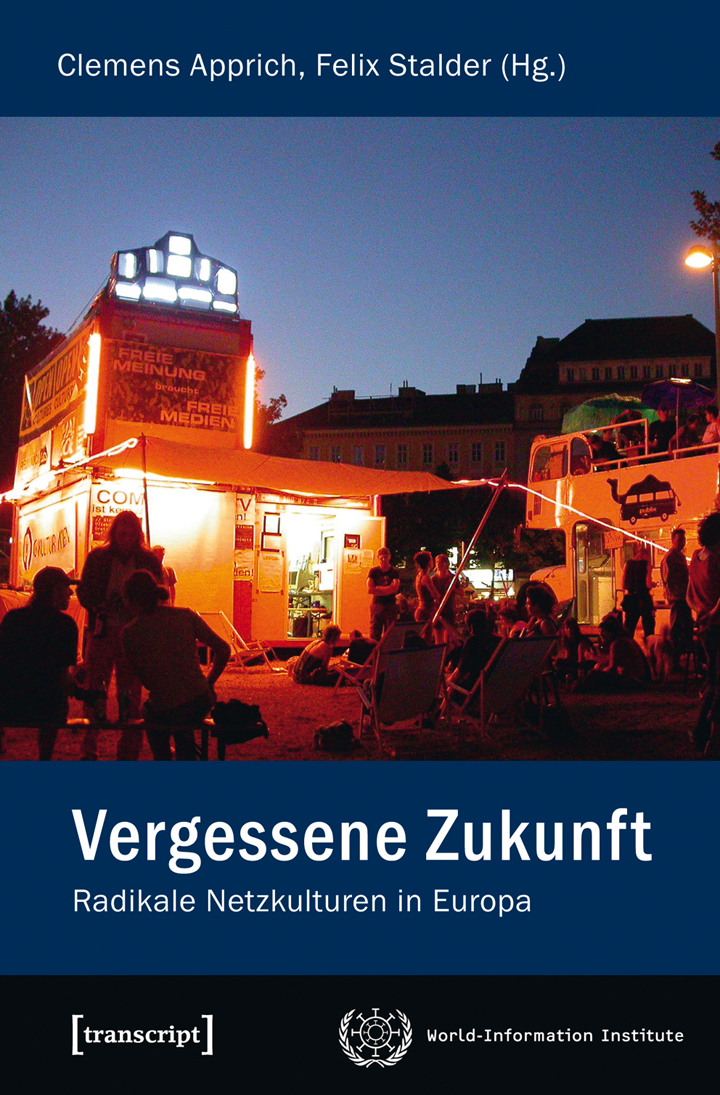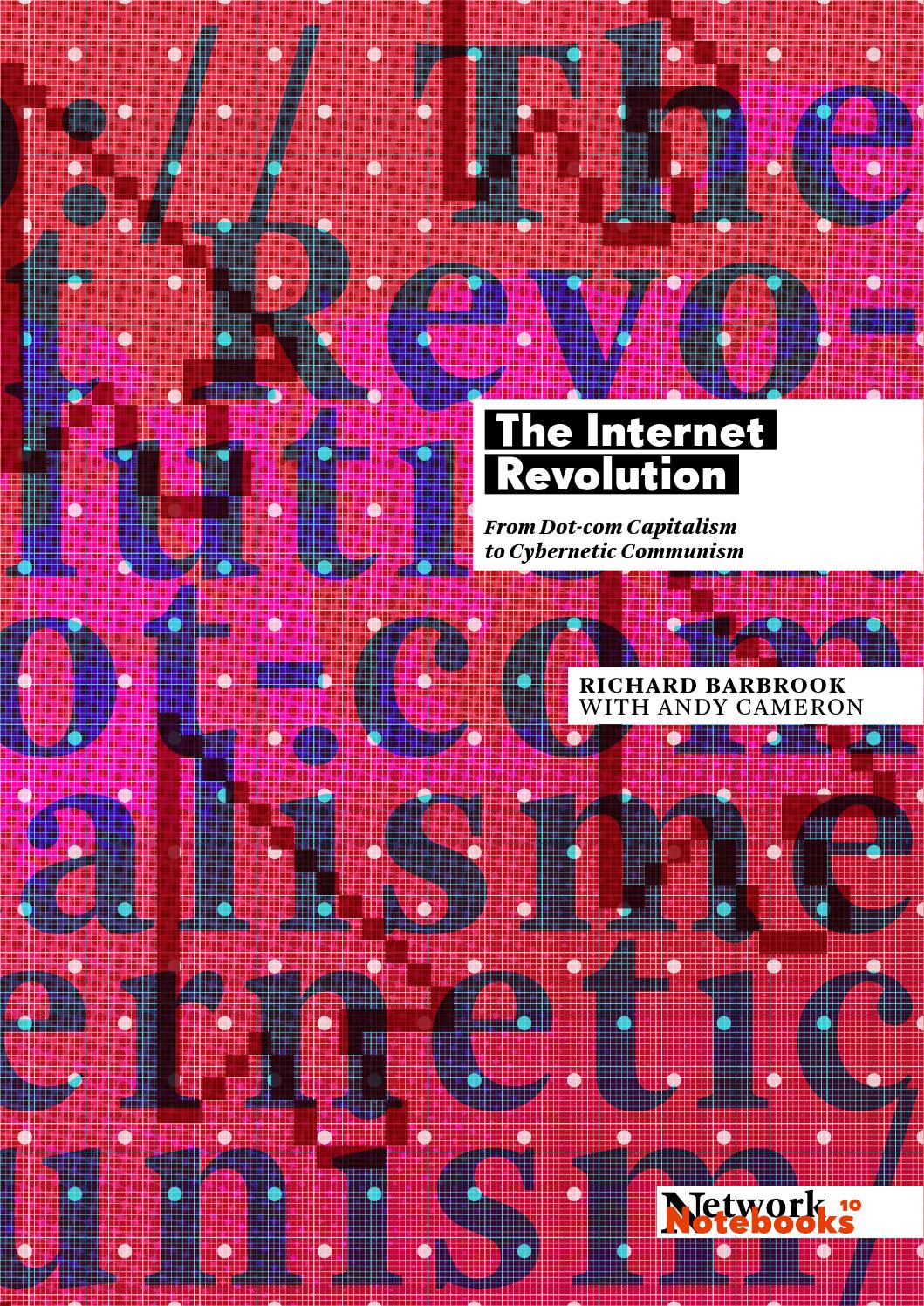Clemens Apprich, Felix Stalder (eds.): Vergessene Zukunft: radikale Netzkulturen in Europa (2012) [German]
Filed under book | Tags: · internet, internet culture, media culture, net criticism, net culture, network culture, networks, web

“Mitte der 1990er Jahre ist in Europa eine vielfältige Netzkultur entstanden. Während die US-amerikanische Szene den Cyberspace als Raum jenseits der Politik imaginierte, waren die europäischen Netzpioniere darauf bedacht, die Möglichkeiten des Internet für neue politische und kulturelle Initiativen in der realen Gesellschaft zu nutzen.
Anhand von Zeitdokumenten, aktuellen Textbeiträgen und Interviews geht dieser Band erstmals auf die kritische Haltung europäischer Netzkulturen ein. Die Beiträge liefern so wichtige Referenzpunkte zur Gestaltung unserer techno-kulturellen Gegenwart jenseits von Facebook und Google.”
Publisher transcript, Bielefeld, 2012
Kultur- und Medientheorie series
ISBN 9783837619065, 3837619060
348 pages
via ResearchGate
Interview with editor: Vera Tollmann (Springerin, 2013).
Reviews: Verena Pizzini (kulturrisse, 2012), Leonhard Dobusch (Netzpolitik, 2012), Werner Reiter (The Gap, 2012), Martin Schmitt (sehepunkte, 2013).
Comment (0)Richard Barbrook with Andy Cameron: The Internet Revolution: From Dot-com Capitalism to Cybernetic Communism (2015)
Filed under book | Tags: · californian ideology, capitalism, communism, cybernetics, cyberspace, internet, libertarianism, neoliberalism, net criticism, silicon valley, technology, virtual reality

“Richard Barbrook and Andy Cameron’s The Californian Ideology, originally published in 1995 by Mute magazine and the nettime mailinglist, is the iconic text of the first wave of Net criticism. The internet might have fundamentally changed in the last two decades, but their demolition of the neoliberal orthodoxies of Silicon Valley remains shocking and provocative. They question the cult of the dot-com entrepreneur, challenging the theory of technological determinism and refuting the myths of American history. Denounced as the work of ‘looney lefties’ by Silicon Valley’s boosters when it first appeared, The Californian Ideology has since been vindicated by the corporate take-over of the Net and the exposure of the NSA’s mass surveillance programmes.
Published in 1999 at the peak of the dot-com bubble, Richard Barbrook’s Cyber-Communism offers an alternative vision of the shape of things to come, inspired by Marshall McLuhan’s paradoxical ‘thought probes’. With the Californian Ideology growing stronger, the Net was celebrated as the mechanical perfection of neoliberal economics. Barbrook shows how this futurist prophecy is borrowed from America’s defunct Cold War enemy: Stalinist Russia. Technological progress was the catalyst of social transformation. With copyright weakening, intellectual commodities were mutating into gifts. Invented in capitalist America, the Net in the late-1990s had become the first working model of communism in human history.
In an introduction written specially for this 20th anniversary edition, Richard Barbrook takes a fresh look at the hippie capitalists who shaped Silicon Valley and explains how their influence continues to this day. These thought probes are still relevant in understanding the contradictory impact of ubiquitous social media within the modern world. As McLuhan had insisted, theoretical provocation creates political understanding.”
Publisher Institute of Network Cultures, Amsterdam, Oct 2015
Network Notebooks series, 10
Creative Commons Attribution-NonCommercial-ShareAlike 4.0 International License
ISBN 9789492302014
51 pages
Replies to ‘The Californian Ideology’ published in Mute 4 (Spring 1996): Introduction, Louis Rossetto (Wired’s editor-in-chief), Franco (Bifo) Berardi, Celia Pearce.
PDF, PDF (4 MB)
EPUB, EPUB (3 MB)
Issuu
Berry, van Dartel, Dieter, Kasprzak, Muller, O’Reilly, de Vicente: New Aesthetic, New Anxieties (2012)
Filed under book | Tags: · aesthetics, computing, floss, hacking, locative media, media art, net criticism, net culture, new aesthetic
The New Aesthetic was a design concept and netculture phenomenon launched into the world by London designer James Bridle in 2011. It continues to attract the attention of media art, and throw up associations to a variety of situated practices, including speculative design, net criticism, hacking, free and open source software development, locative media, sustainable hardware and so on. This is how we have considered the New Aesthetic: as an opportunity to rethink the relations between these contexts in the emergent episteme of computationality. There is a desperate need to confront the political pressures of neoliberalism manifested in these infrastructures. Indeed, these are risky, dangerous and problematic times; a period when critique should thrive. But here we need to forge new alliances, invent and discover problems of the common that nevertheless do not eliminate the fundamental differences in this ecology of practices. In this book, perhaps provocatively, we believe a great deal could be learned from the development of the New Aesthetic not only as a mood, but as a topic and fix for collective feeling, that temporarily mobilizes networks. Is it possible to sustain and capture these atmospheres of debate and discussion beyond knee-jerk reactions and opportunistic self-promotion? These are crucial questions that the New Aesthetic invites us to consider, if only to keep a critical network culture in place.
New Aesthetic New Anxieties is the result of a five day Book Sprint organized by Michelle Kasprzak and led by Adam Hyde at V2_ from June 17–21, 2012.
Facilitated by: Adam Hyde
Authors: David M. Berry, Michel van Dartel, Michael Dieter, Michelle Kasprzak, Nat Muller, Rachel O’Reilly and José Luis de Vicente.
Published in Rotterdam, June 2012
new-aesthetic.tumblr.com (James Bridle’s Tumblr site)
sprint host
EPUB
MOBI
PDF
HTML (annotated version)

